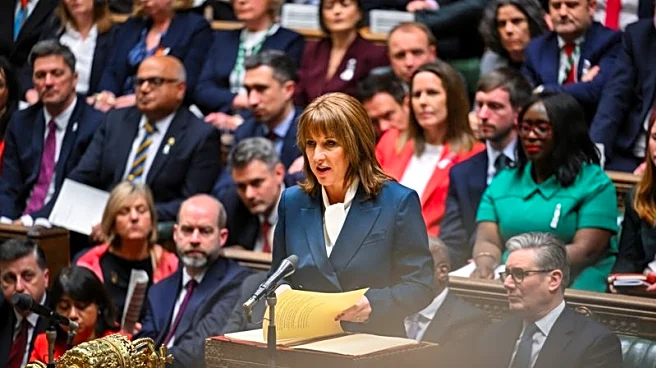By Muvija M and William Schomberg
LONDON (Reuters) -British finance minister Rachel Reeves fought back on Thursday against criticism that she was raising the tax burden to a post-war high to fund more welfare spending and that she was returning the Labour Party to its high-tax, high-spend past.
A day after announcing plans to raise taxes by 26 billion pounds ($34.38 billion), on top of 40 billion pounds in her first budget last year, Reeves faced questions in media interviews about her decision to scrap
a cap on child benefits for low-income families with more than two children.
"I don't think children should be punished by this pernicious policy any longer, and the cost to society of this is huge," she told LBC Radio.
OPPOSITION ATTACKS TAX RISES TO FUND WELFARE
The higher welfare spending was attacked by the opposition Conservative Party which accused Reeves of taking money from workers to appease her restive lawmakers, opening up fresh political dividing lines.
But it presents a challenge to Reform UK, Nigel Farage's populist party which has held a commanding lead in the opinion polls for months and backed the lifting of the two-child cap.
Many of the British newspapers attacked the policy on Thursday morning, with the Metro newspaper popular with commuters saying "You're Paying!".
Reeves denied the charge, but the higher welfare spending includes the cost of a u-turn in July when a rebellion in her party forced the government to drop plans to make it harder for people with health conditions to claim a benefit.
Instead she pointed to a downgrade in Britain's productivity outlook by the country's budget watchdog for the range of tax hikes she announced on Wednesday.
"I have to operate within the forecasts that I'm presented with," Reeves told BBC radio. "Of course I could have made different decisions, but I believe those are the right decisions."
REEVES MAKES HISTORY WITH SCALE OF TAX HIKES
The Resolution Foundation think tank said the "double-whammy" of Reeves' budget measures in 2024 and 2025 represented the biggest back-to-back tax increases by a newly elected government on record.
The Office for Budget Responsibility, which assesses government fiscal plans, said annual welfare spending was expected to be higher by 16 billion pounds at the end of the decade than it would have been under a budget update plan announced by Reeves in March.
Analysts say much of the higher public spending is due over the next few years while the bulk of the tax increases will only kick in later, raising questions about the willingness of the government to stick to them ahead of an election due in 2029.
Reeves said she intended to take further measures to speed up Britain's economy and the forecasts of weaker growth from the OBR did not factor in new trade deals and plans to boost infrastructure investment.
"There's plenty more that I'm going to do to grow our economy and make working people better off," she told Times Radio.
As well as the higher welfare spending, which was demanded by lawmakers in the governing centre-left Labour Party, Reeves' budget plan sought to reassure bond investors that she can meet her borrowing targets.
Long-term British government borrowing costs in financial markets were little changed in early trade on Thursday after falling sharply on Wednesday. The yield on 30-year gilts was flat at around 5.21% by 0905 GMT having dropped by 12 basis points after the budget announcement.
($1 = 0.7562 pounds)
(Reporting by Muvija M; Writing by William Schomberg and Catarina Demony; Editing by Kate Holton and Emelia Sithole-Matarise)















